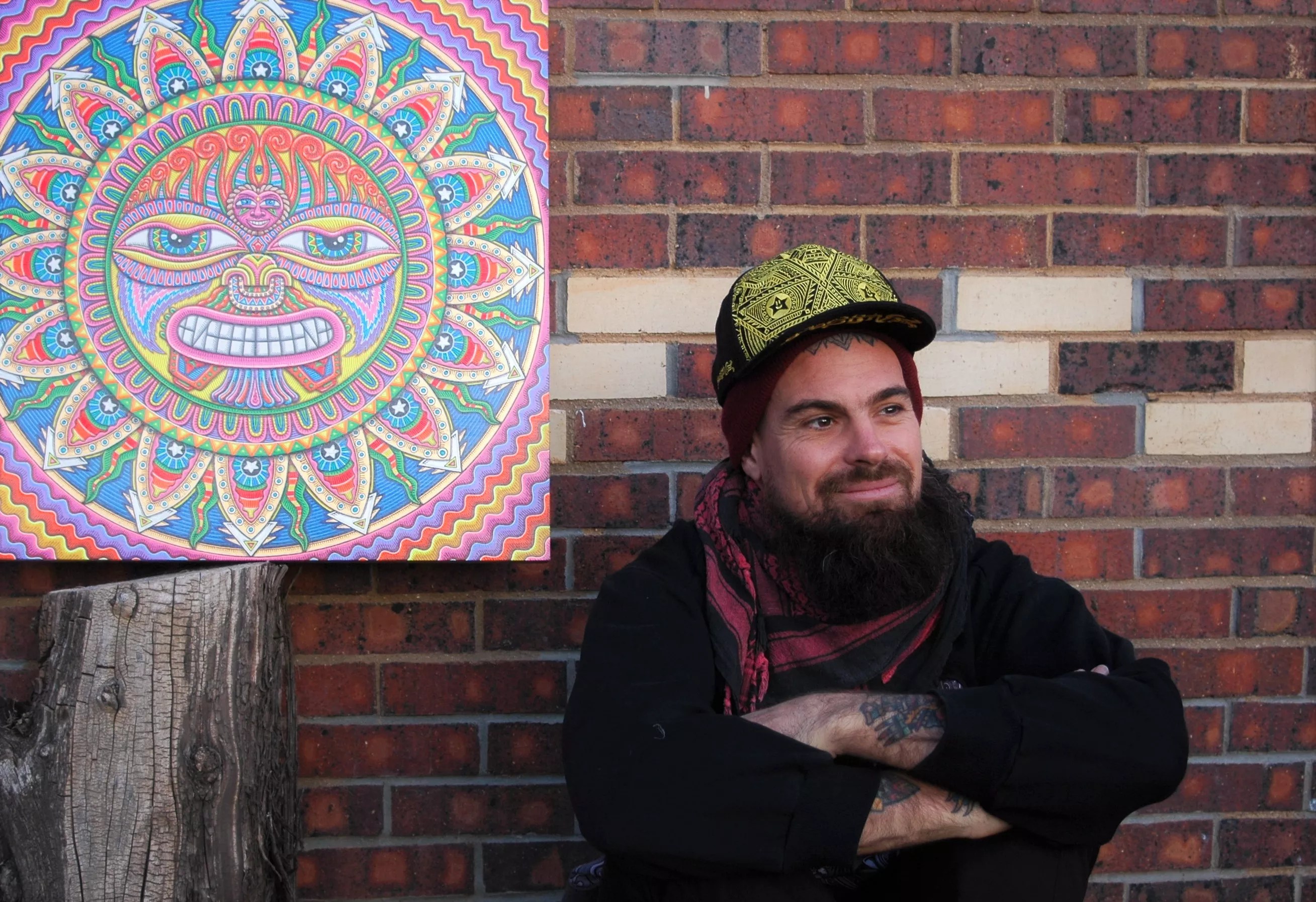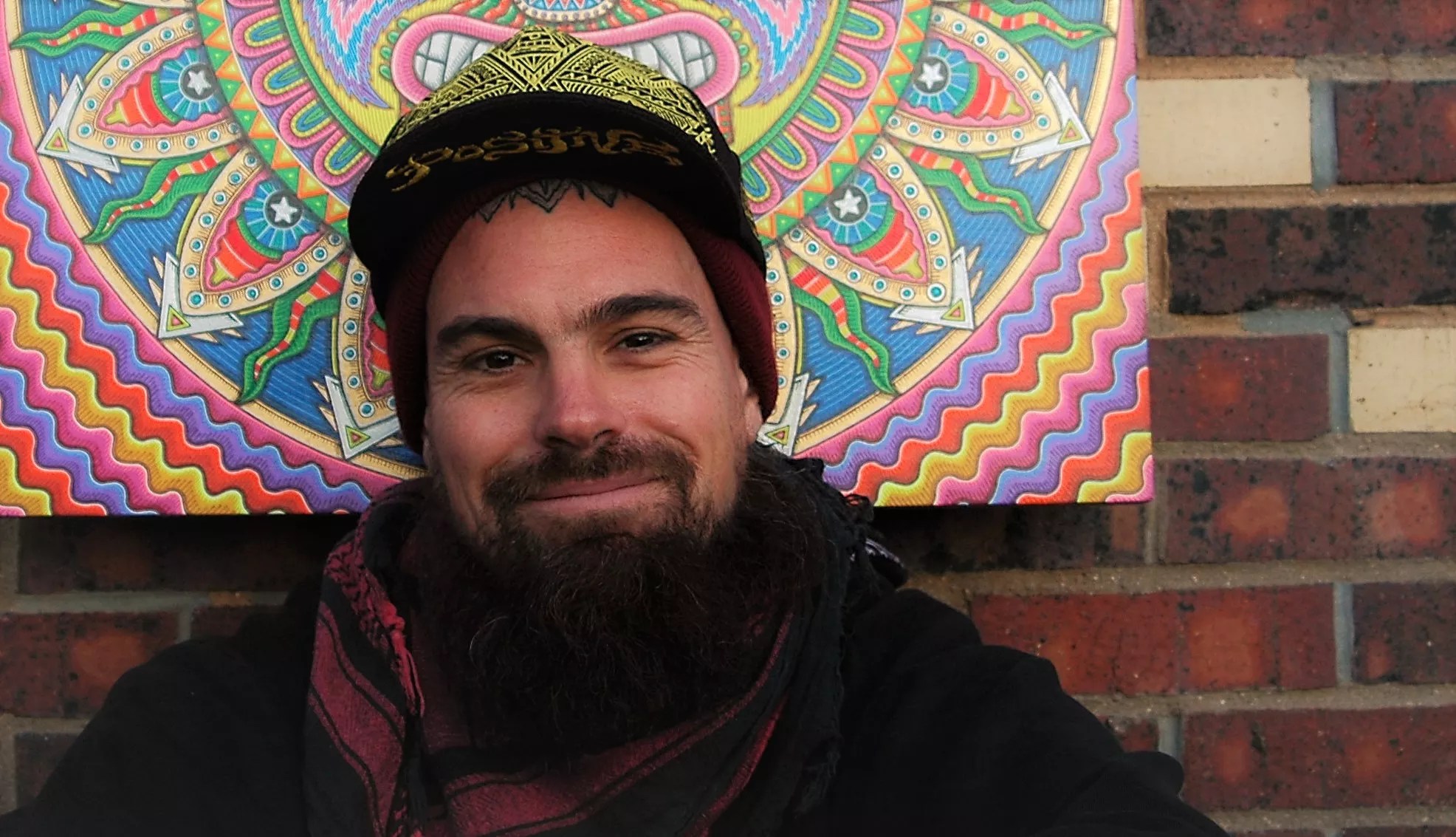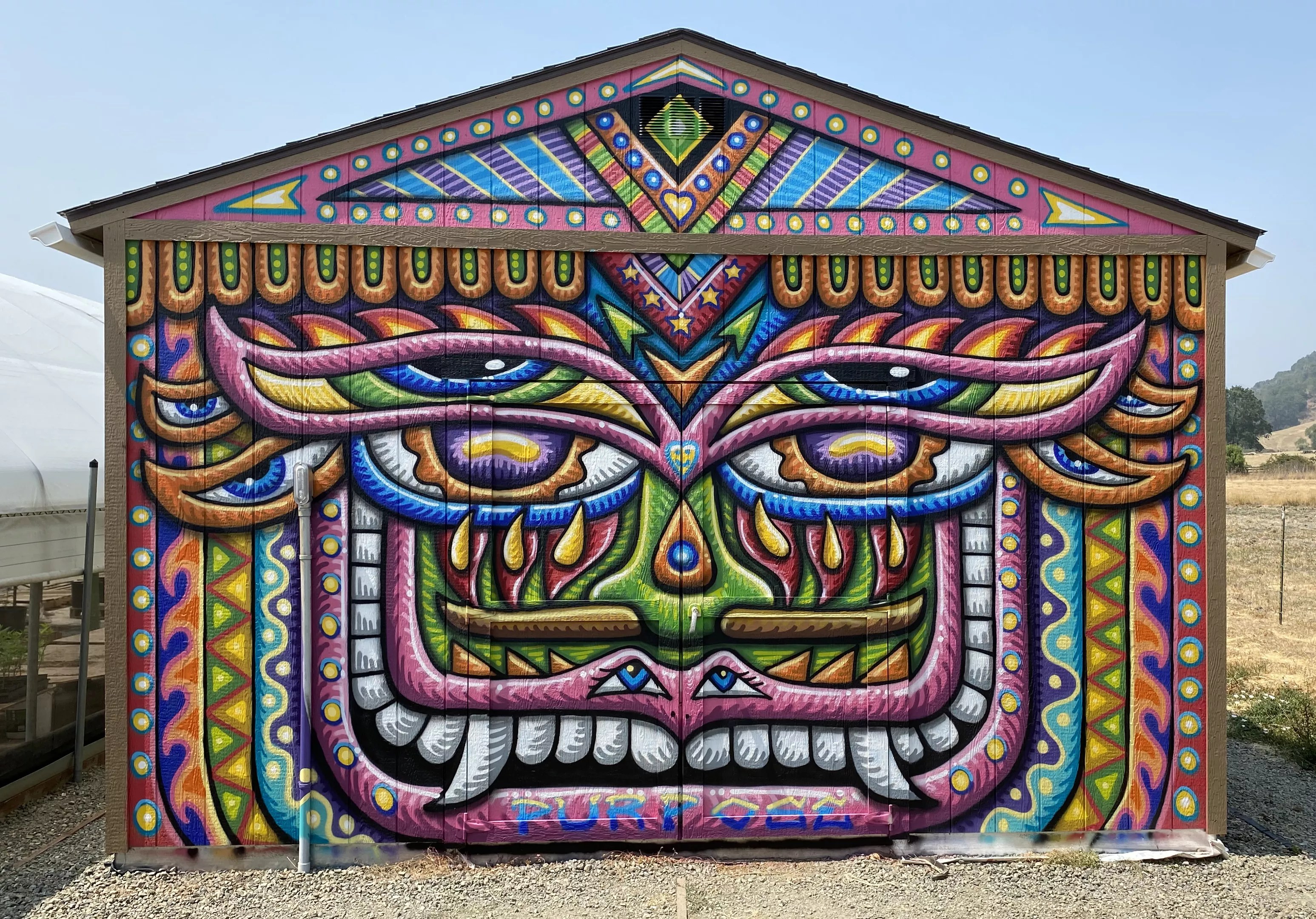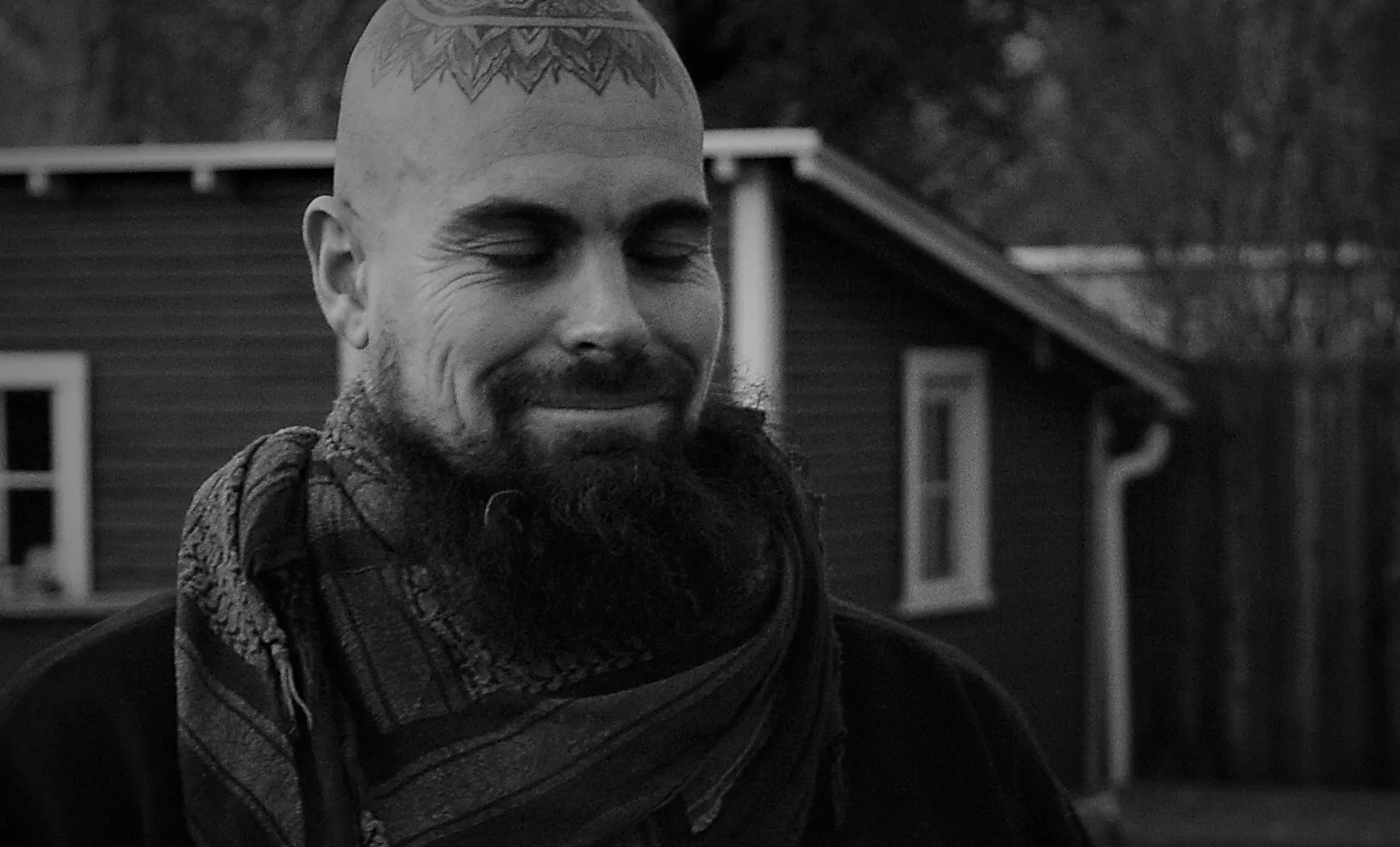
Ally Harmon

Audio By Carbonatix
Chris Dyer was at an ayahuasca healing center in the jungle of Tarapoto, Peru, earlier this year when he decided to cut the dreadlocks that had made him so easily recognizable for the past twenty years. He had just completed his fortieth ayahuasca ceremony the day before, and he was ready for a change. For Dyer, it was another way of expressing the freedom and individualism that he showcases in his art.
An acclaimed visionary artist, Dyer is known for his psychedelic, spiritual artwork that can be seen around the world. He has now relocated from his native Canada to Denver, where his Positive Creations business is based. With a body of work in various mediums including skateboards, murals, paintings and more, Dyer fits right in with Denver’s free-spirited arts scene.
Dyer lived in Canada until he was about four years old, when his parents decided to move to Peru. He stayed there with his family until he was seventeen years old, at which point he was encouraged to attend school in Canada and live with his grandmother. Dyer started exploring his creativity at an early age, and his artistic skills have mostly been self-taught.
His detailed and emotionally powered artwork, with its emphasis on the notions of love, freedom and kindness, has been admired by a widespread fan base over his twenty-year career. Dyer’s work often references the healing facets of psychotropic medicinal plants such as ayahuasca. He is also an author, teaches art workshops and has hosted podcasts and vlogs, all while operating his online shop, where he sells his original art, prints, apparel, puzzles and more.
We spoke with Dyer about relocating, his passions, tattoos, individualism, spirituality, ayahuasca and life in general.
This interview has been edited for brevity and clarity.

Chris Dyer recently relocated to Denver.
Ally Harmon
Westword: Why did you decide to relocate, and how do you feel so far about your time in Denver?
Chris Dyer: It has been good. I was not quite ready to leave my home just yet, but Denver is a nice place, and it’s a good first step. I decided to leave Canada because the laws were becoming too oppressive for my taste.
What made you pick Denver as a landing spot?
I’m lucky that my friend and brand manager, Cory Ponz, had a little spot for me at the Positive Creations house, where my brand is running from, and it’s a good landing spot in the States. I’m definitely going to cruise around and see where it feels like a new home for me, but right away, coming here made sense. I have tons of friends in Colorado and Denver, plus there is a whole artist community here, but who knows where I will land?
I arrived around the end of October, and they put me to work from day one. We have been working on NFT profile pictures, and the project requires me to be drawing characters and various elements of characters. I’ll be drawing for the next couple of weeks. It feels good to be grounded in a fun project and to be doing art, having friends around and being comfortable. There seems to be a great opportunity at this point, so I might as well work with it and see what happens.
Adjacent to the NFT project, have you been working on any other art projects around Denver?
We have a great launch event for my Galaktic Gang NFT project on December 18 at IRL Gallery. Outside of that, I also have a solo exhibition coming up on April 20 at the Mirus Gallery & Art Bar. … It will be a retrospective, solo-art exhibition. I do have some new pieces that I am completing for that. … Since I had to move, I brought my collection here, and this is my chance to share it with the community, but there definitely will be some new art at the exhibit, as well.
What do you think of the local art scene?
The Denver art scene is different from what I am used to. Denver has a very rich and rapidly growing scene. The overall flavor is different from the East Coast cities like Montreal, many of [which] have less hippie and more urban art. Where Denver does have urban art vibes, it also has art with more spiritual intentions, which is something that agrees with me.
You are known for expressing your individualism. Has it always been effortless for you to unapologetically be yourself?
Well, the answer to that is no, I wasn’t always just myself. Growing up in Peru, I attended an all-boys school – you’re supposed to be a certain thing. The certain thing was what’s cool, so if you variated from that, or if you did something different, you were just like a nerd or a free spirit, definitely not in the cool crowd. That was my upbringing as a teenager. Even though I was a freaky, weirdo, artsy kid, I still didn’t want to be rejected. I think we all want to be loved, so I tried to fit in with them, but then it didn’t work out that great. … I moved to Canada, and once again, I was totally different from Ottawa, Canada, people, but then they kind of loved me for being this wild, crazy dude that was a former street gang member, surfer, skateboarder, destructive, drunken bastard. But that was just another mask, too. So you’re out there, and you’re trying to be loved and accepted, and you try to find what your identity is – something that is both authentic and also something that people can tolerate.
Now I’m in my forties, so I’ve had a couple of decades to deconstruct some things. I started tree planting and connecting with nature on a deeper level. I changed my name. I’ve been trying to let that all go. This year has been a strong one for that. I cut my dreadlocks off, which I had for 21 years. I felt cool and beautiful with them, but then the medicine [ayahuasca] challenged me. I cut them, and now I have a bald head to kind of look at myself in the mirror and be like, ‘Look, this is still you.’
It’s been a process for me. I don’t know if I have the key or the solution for anyone else to escape their box – it’s individual work that we all have to do, and it’s not easy. For me, the shamanic path looks like a road of learning how to be detached, in a way. So right now, my latest thing that I had to drop was my apartment in Canada, my friends, my city, my home, but those things do not make me, either.

A mural Dyer painted, “Happy House.”
Courtesy of Chris Dyer
You’ve been open about your experiences with plant medicine. What are your thoughts on ayahuasca and healing plant medicines, and what would you say to those who haven’t experienced it?
The medicine is definitely a big gift to humanity – a very potent, strong tool to help us liberate and heal past traumas; but know that it is a double-edged sword. You want to be gentle with yourself. You want to do it in the right setting, with the right people, with the right intention. Go easy on yourself, and give yourself time to integrate the lessons. It’s not a thing to use to escape the problems that you have. … The work is done outside of the medicine space, when you live your everyday life, but knowing what you’re supposed to do. And that’s the hardest thing, because you’re not feeling high anymore. You’re just kind of walking through the mud and trying to be chill about it.
It is definitely an ally, and a portal to our alien families that are cheering for us on the other side of reality, on a different frequency. They’re waiting for us to ascend and raise our vibration so we can finally see each other once we are on a similar frequency. I value plant medicines, always with respect and optimism that humanity will make it in the end. I am thankful and grateful for their contribution in our process.
I first started working with the medicine in 2013. I initially did it out of curiosity, but once I engaged with that entity – that motherly entity – I saw that it was an ally that I had already been working with for all of my life, and that it was there to help me throughout the years. Ever since then, I have been doing a few ceremonies a year to re-calibrate and center my being, also to purge out what is no longer needed and to keep on moving forward in my personal evolution, back home to the source.
You recently went on a strenuous ayahuasca healing journey at about the same time that you cut your dreads. How did the ceremonial integration of plant medicine affect your decision?
Cutting the dreadlocks came right after my fortieth ayahuasca ceremony. … I had no expectations for my fortieth ceremony. … It ended up being super potent, and it was very difficult. I was battling a demon that was resisting exiting, and my psychic friend who was my student was doing some singing bowl work and energetic work. We succeeded in removing this worm that was embedded in my heart; an energetic worm. Inside that space, I was at the gates of heaven or the gates of God – whatever you want to call it. And I prayed to it once again.
I always pray for my liberation – I just want to be free. I don’t want to care what people think about me, I just want to be happy with how I am. God was like, ‘Just be free, jump in the water.’ … To jump in the water, I had to cut my dreads off, which is a big attachment to me; it was my identity, or how people thought about me. The next morning I cut it in ceremonial fashion in front of my class that I was teaching, I put music on and I gave a speech – it’s all on YouTube. It was pretty soulful.

Chris Dyer had his artwork tattooed on his head.
Ally Harmon
We saw that you got the top of your head tattooed with your signature art. It looks amazing! Do you have any advice for people thinking about doing something like that?
Yes, get drunk [laughs]. Well, it has to be the right artist – I have some janky tattoos. … I got a really good tattoo artist, my friend Joseph Haefs in Las Vegas, and we traded. I painted him a mural in his backyard, and he tattooed the dome of my head. He is shamanic, too, and he’s a person that works with [plant] medicines. … I felt comfortable with him doing it.
The beginning of the session was very shamanic: We put on ceremonial music and just vibed out. It was painful, but I kind of breathed through it. By hour four, I was like, ‘I can’t keep going like this.’ I went and bought a six-pack, chugged it, and just kept listening to some podcasts to keep my mind entertained, because it was getting quite difficult. I just had to get out of my head to not feel the shading part where you’re just scraping dome; it got done. I’m very grateful to now have that. It gives me protection and also an opening, because it’s a symbol of God that I put on my head. The sun art is my visual representation of God. Now I feel like I have opened up that channel a little bit better to it.
You have scattered paintings/drawings/art all across the globe that people commission. Do you have any specific example of your work at any location that is particularly special to you?
I guess I’m pretty proud that I got to paint murals for the street art museum in Amsterdam and the one in Russia. I painted a mural at the Bob Marley museum in Jamaica. I also really like my skateboard artwork; I’ve done over a hundred skateboard graphics for different brands, and I always love it when I see a kid skating on my art. My paintings, on the other hand, are my paintings; I paint them mostly for myself. I don’t love selling them, because they’re for me. I hope to be able to share it in some kind of cohesive place or environment in the future.
I’m still too young to start building my museum, but that is a long-term plan down the road, so I’d rather not sell my paintings. I’m actually rebuying paintings that I sold before to keep my main collection together. That way, if somebody really wants to jump into my brain, they can go and walk through the work that I’ve done and connect with me like that. It’s a work in progress, like many years down the road, but I hope that will be my main offering one day.
There are countless testimonies from around the world of your kindness, leadership and positivity. What are your thoughts on positivity in general, and why do you believe that it is important?
When I speak of positivity, I first want to acknowledge the shadow, the negativity, as an equally powerful force that does exist on this planet, and that God created for a reason in order to experience it all. … But I feel that it’s our natural desire to go back to the source, and the source is love. Oneness is happiness, peace, the good feelings, and it makes more sense to me to put more focus on those things that feel better, both for myself and for others.
When I am nice to another person, or when I “spread positivity” to any community, that feels good to me. It could even be seen as a selfish act, but I like to live life with positivity and optimism and to do good to others. … We will still have suffering, of course, what can you do? You can’t control those things. So suffering, sadness and negative feelings will always be there. If we can all try our best to make everybody else happy, then we will just be happier.
Do you have something that you are looking forward to doing leisurely or professionally?
My second book is in the works, and it’s 75 percent done, but I want a happy ending to it before I ever think of publishing it. I’m waiting for my life to have a happy ending, or at least something more stable. At this stage so far, it’s just been a bunch of bumps. … I’ve been doing books since I was about eight years old. This one will be a synopsis of my last ten years of traveling, events, ceremonies, rituals.
I think that books are the ultimate offerings, where people can read what each painting is about and truly get to know the full expression of what I’ve been up to for all the years. But for now, I just have paintings to paint. I would like to find a place to relax, be with nice people, maybe find my life partner and make a human if that’s in the vibes. We’ll see – I’m just the witness, cruising and going with the flow.
Chris Dyer Presents Galaktic Gang: The Official NFT Launch Party, 7 p.m. Saturday, December 18, at IRL Gallery, 2611 Walnut Street, irlartgallery.com.